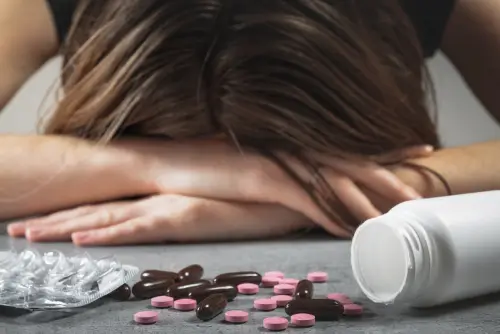Attention Deficit Hyperactivity Disorder (ADHD) is a neurological disorder that affects the ability to focus, organize and control impulses. Individuals with ADHD are at an increased risk of developing substance use disorders (SUD), as they may use different substances like drugs or alcohol to self-medicate or cope with their symptoms. Luckily, many tools are available today to teach individuals how to resist substance abuse.
In this article, we will cover what ADHD is, the symptoms of ADHD, the correlation between ADHD and substance abuse, practical tools you can use to resist substance abuse, and treatment plans available for substance abuse.
What is ADHD?
According to the American Psychiatry Association, ADHD is defined as “a persistent pattern of inattention and/or hyperactivity-impulsivity that interferes with functioning or development.” This definition of ADHD emphasizes that the symptoms of ADHD are persistent and pervasive, causing significant impairment in multiple areas of life. It is important to remember that ADHD is a complex disorder, and the presentation of symptoms can vary significantly from person to person. Individuals with ADHD may also experience co-occurring conditions like anxiety, depression, and learning disabilities.
These patterns and symptoms of ADHD typically appear in childhood but can persist into adulthood. In a survey conducted by the National Comorbidity Survey Replication, the prevalence rate of ADHD is currently 4.4%, which affects around 10.5 million adults in the United States. While around 50% of children with ADHD outgrow their symptoms, about one-third continue to experience symptoms into adulthood.

Symptoms of ADHD
It’s common for many adults not to realize they have ADHD, as the symptoms can be less noticeable. The symptoms of ADHD can be grouped into two categories: inattention and hyperactivity-impulsivity. Here are some of the most common symptoms of each category:
Inattention
- Difficulty concentrating on tasks or activities that require sustained attention
- Difficulty organizing tasks or activities
- Easily distracted by external stimuli
- Poor time management skills
- Frequently losing or misplacing things
- Forgetfulness
- Difficulty following through on tasks or completing projects
- Procrastination
- Poor attention to detail
Hyperactivity-Impulsivity
- Restlessness
- Difficulty staying seated for extended periods
- Interrupting others during conversations or meetings
- Talking excessively
- Acting impulsively without thinking through the consequences
- Difficulty waiting for one’s turn
- Difficulty engaging in leisure activities quietly
- Engaging in risky behaviors
ADHD and Substance Abuse
Studies have found that individuals with ADHD are at an increased risk of developing a substance use disorder. One study by the Journal of the American Academy Of Child and Adolescent Psychiatry found that individuals with ADHD were more than twice as likely to develop a substance use disorder compared to individuals without ADHD. This shows the need for individuals with ADHD to be aware of their increased risk, manage their symptoms, and reduce the risk of developing a substance use disorder using the tools provided.
Why are individuals with ADHD more likely to develop a substance use disorder? Firstly, ADHD can make it challenging to resist impulsive behaviors, including the use of drugs or alcohol. Individuals with ADHD may also have difficulty with planning and decision-making. Secondly, substance abuse can exacerbate the symptoms of ADHD, which can further perpetuate the cycle of substance abuse and make it more difficult for individuals to control their behavior.
While struggling to control their symptoms, individuals may turn to self-medicating. Unfortunately, in many cases, this self-medicating turns into substance abuse and addiction, which can have dangerous side effects.
Self-Medicating & ADHD Medication
Self-medicating is when a person chooses and takes medicine or other substances to alleviate their medical symptoms. With ADHD, individuals may start using drugs and alcohol to control their symptoms or abusing their ADHD medications. Self-medication is not an effective or safe way to manage ADHD symptoms and can be detrimental to treating ADHD.
Prescribed medications, such as stimulants and non-stimulant medications, are commonly used to treat ADHD. These medications work by increasing the neurotransmitters in the brain associated with attention, focus, and impulse control. Stimulant medications, in particular, have a high potential for abuse and can be addictive. Using stimulant medications can lead to serious health consequences, including heart problems, seizures, and even death.
The consequences of misusing ADHD medication or developing a substance use disorder are huge. Because of this, it’s essential to know and understand the tools you can use to help resist substance abuse.
Practical ADHD Tools to Resist Substance Abuse
Individuals with ADHD who struggle with substance abuse may benefit from a range of practical tools and strategies to help resist the urge for substance abuse. It’s important to note that many different tools and strategies can be beneficial, but finding the ones that work best for you is vital.
Developing a Support Network
Building a support network of friends, family, and peers who understand the challenges of ADHD and substance abuse can be powerful in resisting substance use. Support groups and online communities can also be helpful resources.
Creating Routines
Establishing a daily routine can help individuals with ADHD maintain structure and consistency, reducing stress and the urge to self-medicate. This can include a regular sleep schedule, meal times, exercise, and other activities.
Setting Realistic Goals
Setting and working towards realistic goals provide a sense of purpose and accomplishment, boosting self-esteem, creating confidence, and reducing the need for self-medication. Goals can be related to work, school, relationships, or personal interests.
Stress Management
Stress can trigger substance abuse, so learning effective stress management techniques can be important for resisting the urge for drug or alcohol use. Techniques such as deep breathing, meditation, and exercise can help manage stress.
Utilizing Technology
Smartphone apps and other digital tools can be helpful in managing ADHD symptoms and reducing the risk of substance abuse. These can include apps for managing medication schedules, tracking symptoms, and monitoring mood.
Seeking Professional Help
Mental health professionals can provide individuals with ADHD and substance abuse with a range of tools and strategies for managing their symptoms and resisting the urge to use drugs or alcohol. Treatment may involve therapy, medication management, and other types of support.

Professional Help for Substance Abuse & ADHD
When seeking professional help for substance abuse, the treatment can vary depending on the individual’s specific needs and circumstances. However, the treatment should be comprehensive and include a combination of therapy, medication, and support groups.
Therapy
Various types of therapy can effectively treat substance abuse, including cognitive-behavioral therapy, dialectical behavior therapy, and psychotherapy. Therapy can help individuals identify and change negative thought patterns and behaviors, learn coping strategies, and develop healthier communication and relationship skills. These therapies can be done in an inpatient or outpatient treatment center.
Medication
Medication can sometimes help individuals manage cravings and withdrawal symptoms associated with substance abuse. Medications such as methadone, buprenorphine, and naltrexone are commonly used for opioid addiction, while medications such as acamprosate and disulfiram are used for alcohol addiction.
Support Groups
Support groups such as Alcoholics Anonymous and Narcotics Anonymous can help provide individuals with a supportive community of peers who understand the challenges of addiction. These groups provide a safe space for individuals to share their experiences and offer mutual support and encouragement.
Dual-Diagnosis Treatment
Many individuals with substance abuse issues also have co-occurring mental health disorders such as anxiety, PTSD, depression, or ADHD. Dual-diagnosis treatment programs address both substance abuse and mental health disorders simultaneously to ensure that both conditions are effectively managed.
Substance Abuse Treatment in Los Angeles
At Launch Centers in Los Angeles, we offer holistic mental health treatment services and addiction treatment services to those struggling with their mental health and substance abuse. Our programs focus on evidence-based, individualized, and trauma-informed approaches to give our clients the best support and resources. Launch Centers is dedicated to empowering young adults in helping them recover from mental illness and substance abuse so that they can live meaningful lives.
If you or a loved one are suffering from mental health conditions and would like to get help now, contact us today to learn more about our programs.





